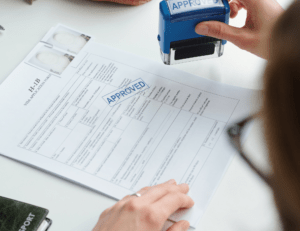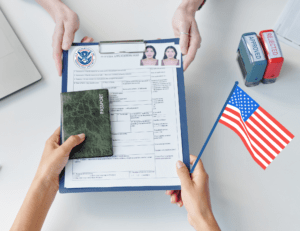WHAT ARE THE REQUIRMENTS FOR A E1 OR E2 VISA?
 What are the requirements for an E-1 visa?
What are the requirements for an E-1 visa?
Nationality: The applicant must be a national of a country that has an eligible treaty with the United States.
Substantial Trade: Both the foreign company and the US company must have substantial, continuous trading.
Trade is Principal Activity: The trade must be the principal activity of the US business in which the applicant is investing or is employed.
Substantial Investment: There must be a substantial investment of the applicant’s own capital in the US business or, alternatively, the applicant must be an essential employee with specific qualifications that are necessary for the efficient operation of the trade.
Employee Role: The applicant should be an essential employee of the company, occupying either a supervisory or executive position, or possessing specialized skills that are vital for the efficient operation of the trade. Ordinary skilled or unskilled workers typically do not qualify for this visa.
Intent to Depart: The E-1 visa is a non-immigrant visa, which means that it is temporary and does not grant permanent residency in the US. The applicant must intend to depart the US when their E-1 status expires. This is a tricky requirement because it is difficult to show an intent to depart in two years when you are building a business investment in the US. You need to play this requirement both ways: show that not only is the investment viable and somewhat long term, but also show that you do not have an intention of living permanently in the US past your E-1 investment period. This would not be a good visa if you intend to apply for permanent residency in the US.
What are the requirements for an E-2 visa?
Nationality: The applicant’s home country must have a qualifying treaty of friendship, commerce, and navigation with the United States.
Substantial Investment: The applicant must make a substantial investment in an existing or new US business. The investment should be enough to ensure the successful operation of the business. There is no fixed minimum investment amount required, but the investment should be “substantial.” It should also be able to create jobs and support the business’s growth. The money must be “at risk,” which means that it is already committed to the enterprise.
Source of Funds: The funds used for the investment should come from a legitimate and lawful source. The applicant should be able to demonstrate the origin of the funds.
Ownership and Control: The applicant must own a significant portion of the US business and have control over its operations. The investment should not be a passive investment, meaning the investor should be actively involved in managing and directing the business. The E-2 investor visa is not for an ordinary skilled or unskilled employee; the principal E-2 investor must be directing and managing the investment, not just working there.
Not “marginal”: The business must not be “marginal,” meaning it should have the capacity to generate more than just enough income to support the investor and their family. The business should have the potential to create jobs and contribute to the US economy.
Investment in Active Business: The investment must be in an active, for-profit business. Speculative or idle investments, such as undeveloped land or stocks, generally do not qualify.
Business Plan: The applicant must provide a detailed business plan, which outlines the nature and purpose of the business, as well as how the investment will contribute to its success.
Intent to Depart: The E-2 visa is a non-immigrant visa, which means that it is temporary and does not grant permanent residency in the United States. The applicant must intend to depart the US when their E-2 status expires. This is to ensure that the visa is being used for temporary, non-immigrant purposes. However, this is a tricky requirement because it is difficult to show an intent to depart in two years when you are building a business investment in the US. You need to play this requirement both ways: not only show that the investment is viable and somewhat long term, but also show that you do not have an intention of living permanently in the US past your E-2 investment period. If you eventually want to apply for permanent residency, you should consider another visa.

 What is an E-1 visa?
What is an E-1 visa? Can my spouse and children come to the U.S. with me?
Can my spouse and children come to the U.S. with me? Once your H-1B petition is approved, you can get the visa stamped in your passport. If you are already in the United States, it is not required to get the stamp before working on your H-1B visa. However, if you are outside the U.S. or are planning to travel outside the U.S., then you’ll need a visa stamp.
Once your H-1B petition is approved, you can get the visa stamped in your passport. If you are already in the United States, it is not required to get the stamp before working on your H-1B visa. However, if you are outside the U.S. or are planning to travel outside the U.S., then you’ll need a visa stamp. How long will my H-1B visa be valid?
How long will my H-1B visa be valid? Whether you are outside or inside the U.S., the process of applying for an H-1B visa is the same.
Whether you are outside or inside the U.S., the process of applying for an H-1B visa is the same. First, if the employer is subject to the numerical cap, then both the employer and foreign national must register with the United States Citizenship and Immigration Services (“USCIS”) to enter the lottery system because there are always more applicants than visas available. The registration is $10. The registration window is March 1
First, if the employer is subject to the numerical cap, then both the employer and foreign national must register with the United States Citizenship and Immigration Services (“USCIS”) to enter the lottery system because there are always more applicants than visas available. The registration is $10. The registration window is March 1 What types of positions are typically specialty occupations?
What types of positions are typically specialty occupations? First, the position itself must meet the criteria to qualify as a specialty occupation. Second, the foreign individual must be qualified to perform the duties of the position, and documentation establishing both are required.
First, the position itself must meet the criteria to qualify as a specialty occupation. Second, the foreign individual must be qualified to perform the duties of the position, and documentation establishing both are required. When you go to a USCIS-approved doctor for the service of USCIS medical exam, remember that–for the purposes of the USCIS exam–the doctor works for the US government, not for you. Anything that you tell the doctor could be communicated to the US government. The doctor cannot violate medical ethics by communicating information about you to other parties aside from USCIS, but for the purpose of the exam, you are consenting to the doctor sharing all information with USCIS.
When you go to a USCIS-approved doctor for the service of USCIS medical exam, remember that–for the purposes of the USCIS exam–the doctor works for the US government, not for you. Anything that you tell the doctor could be communicated to the US government. The doctor cannot violate medical ethics by communicating information about you to other parties aside from USCIS, but for the purpose of the exam, you are consenting to the doctor sharing all information with USCIS.